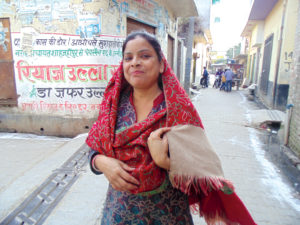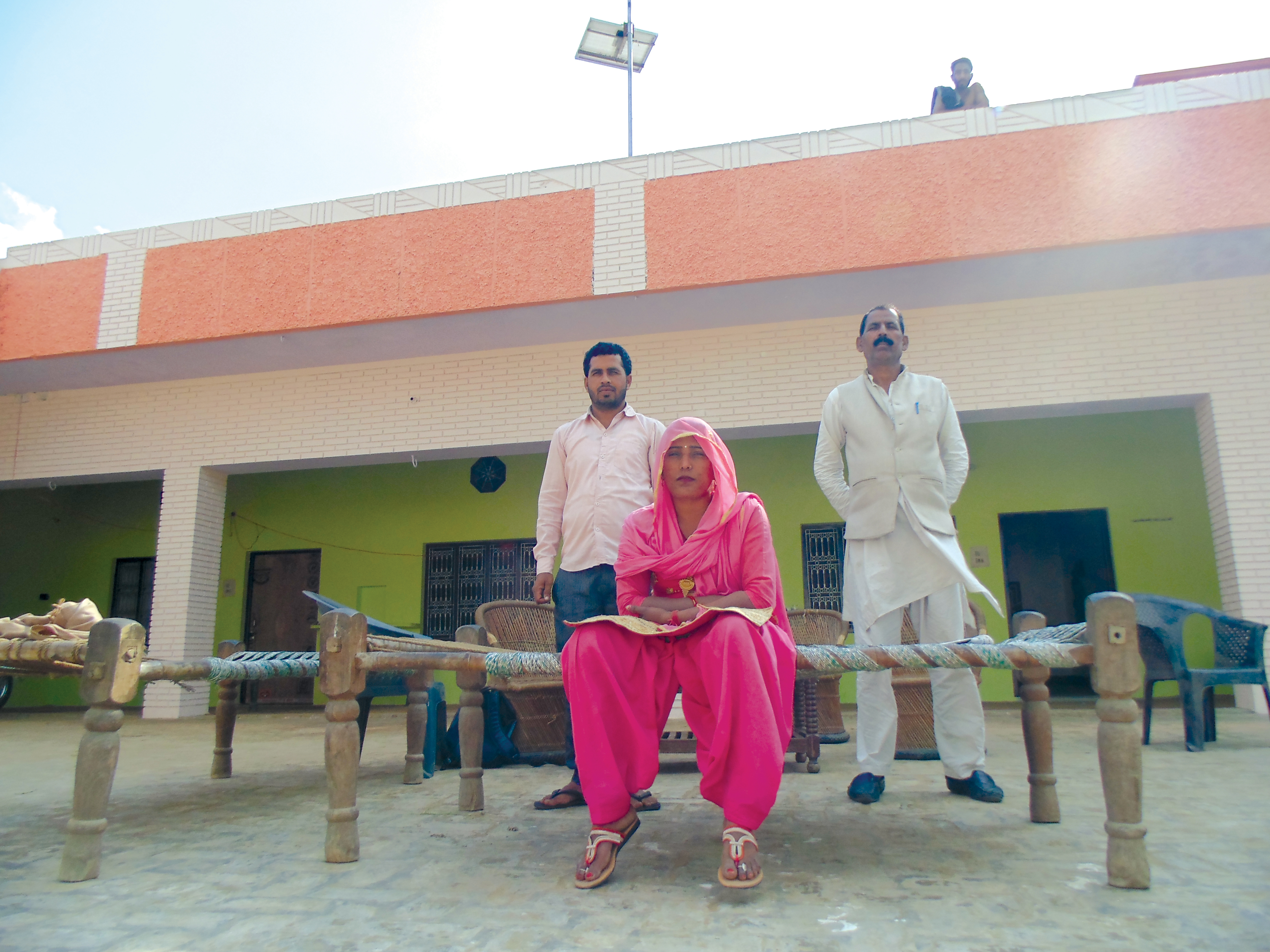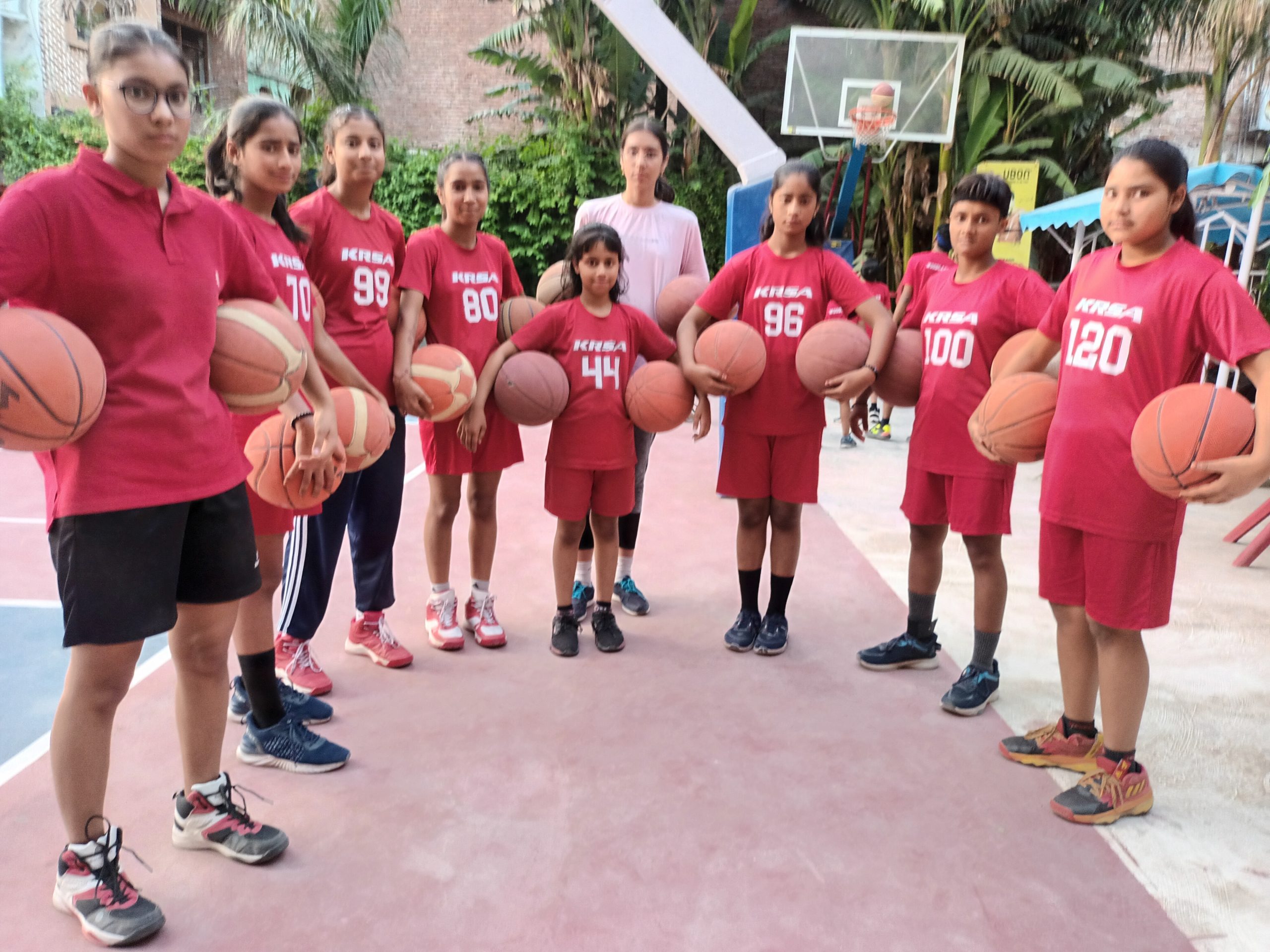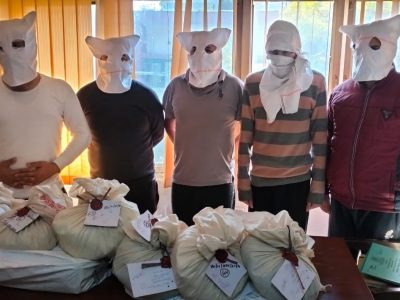Are elected women leaders just proxies for the men in their families, or do they have real control? In search of answers, Patriot went to Meerut district to meet two women leaders — a village Pradhan and a Nagar Panchayat Chairperson
Bharoli village in Mawana tehsil is criss-crossed with little lanes that lead into homes of its residents. At one end of this cluster is a two-storey house with nine rooms and a large front yard. On one side is a shelter for buffaloes, on the other, two functioning toilets. On the porch of the house are placed two charpoys and a few chairs.
We are greeted by Dayachand. He seats us just as a timid man, his son Deepak, comes to serve us tea and fruits.
Deepak’s wife Komal is the elected Pradhan of the Gram Panchayat since 2015. She doesn’t show up until we finish our conversation with her father-in-law, whereupon she is summoned. A pink dupatta hiding her face, she is accompanied by her sister-in-law Archana (sans the veil).
The ghoonghat is still worn many northern Indian villages by married women – in this case in front of elders.
Dayanand quickly gets up and walks to the corner of the courtyard, still keeping an ear open for our questions, responding when his daughter-in-law does not have the answer or fails to understand the query.
Just as we start forming a poor impression of the role she plays, Komal reacts to a question about how it feels to have power. Her eyes light up and a big grin emerges on her face which was just a minute ago, too subdued to suggest such a response.
In this place, where old customs and the new are in a tussle to emerge, no one indication can be signed off as fact.
Where the levee breaks
Komal married Deepak in 2011, and four years later was put up to the task of bringing the power of the village to her home.
For the last five terms, a woman has won the Pradhan’s seat, including Komal. Dayachand acknowledges that in the previous cases their husbands made them fight in the elections.
This time it was the father-in-law who had lost the last elections in 2010 by just 25 votes. Having studied till 10th grade, Komal was perhaps the perfect candidate, as Dayachand’s wife is not literate and his daughters too young at the time to fight an election.
For an outsider, it is not easy to judge whether there has been a change in the mindset of the people after almost 25 years of having a woman as head of the village. Komal calls the change in the outlook of people towards women as slow, but still ongoing.
Of Dayachand’s own daughters, Aanchal has studied till 12th, while one is currently in 10th grade and another married off. Aanchal, unfortunately, has no plans to carve out a role for herself, despite her education. She says by way of explanation: “Gaon main aisa hi hota hai” (This is what happens in a village). Her father says, predictably, that Aanchal hopes for a good home to go to and do seva.
The role of a woman in the village still seems bound to her duties of being a wife and mother.
Village men that we met call her a good leader who has brought in good roads, but they don’t have much more to say. Our attempts to get the opinion of women proved futile as they ran into their rooms as they saw men approaching.
They tell me later, that for them, whether the Pradhan is a man or a woman does not matter, what matters is the candidate.
So, the real question is: Does Komal take the calls or is she strictly left to sign on the dotted line when required to? Dayachand accepts that she takes his opinion into consideration and also that of other villagers.
Since she has come to power, other than roads being built, nallahs have been constructed, street lights installed, water tanks bought and toilets constructed. “I told the people that if you make me win then I will work for the betterment of the village”.
She also wants schools close by, which will help girls get education, as they would not have to travel long distances. Komal cites this as an imperative to see women become equals.
We leave with a question hanging over us. Perhaps she calls the shots. Or perhaps he walks in her shadow.
A little away from Bharoli is Shahjahanpur, where about 20,000 people reside. Each lane looks well swept, and you hardly see garbage in corners. The area gets electricity for about 18 hours a day. And it’s all because of one woman — Rama Begum (40), chairperson of the Nagar Panchayat, a body that is meant to help a rural settlement transition to a township.
Born in Shahjahanpur, she spent her golden days of childhood in the area, playing in the narrow lanes, but never did she think that she would be looking after these same lanes.
In December 2017, Begum won the election by 1,006 votes. Her opponent, the incumbent leader, lost out due to his obvious incompetence.
“He never showed much interest in the development of the area, only for the street he lives on. Even if the street light was off, he would not get it fixed for days,” says a resident who requests not to be named. “With her (pointing out at Begum) that’s not the case,” he adds. As she walks down lane after lane, carrying out an inspection, every other person in the neighbourhood greets her with a big smile and has good words to say.
Begum possesses all the qualities of a good leader: she works efficiently, gives freely of her time, is accessible, solves people’s feuds and looks after the most important thing — development. She studied only till high school, as the area lacked a college at the time.

“I met MLA Yaqub Qureishi today who was in the area for some work and I never ever thought about politics, but I am part of it now,” tells Begum.
Why did she enter politics? She says her husband came up with the idea. He fought and lost the last election, losing by eight votes. “It was his bad luck, I won this time with 1,006 votes,” she says.
Talking about the problems that come up to her, she says, “I don’t bother about what time it is, I accompany them to the police station. When the police don’t entertain the problems at night, I go again in the morning to get it solved.” Begum also says that 80% of the cases get solved without seeking police’s direction.
After taking up the position of the chairperson in 2017, the first challenge for Begum was to get the people their ration cards. “Earlier only 14-15% of the population had ration cards, now it is 75%,” she says.
The streets were in such bad shape, relates Begum, that “When the weekly council meetings used to happen, one could only reach the place after dealing with the traffic mess.” Some lanes are paved with new tiles and others are in construction mode.
“I’ve been seeing these lanes since my childhood and they never met the standards. But that’s not the case anymore,” says Begum.
Begum has also taken an initiative to revamp the “famous” pond of Shahjahanpur. “They (municipal corporation) wanted to clean half of it only, despite our request to clean the rest of it. So we have filed a case in court. The judge will give a decision on 14th of this month,” says Begum.
Another goal is to get the administration to put up 350 street lights. Apart from this, a flag stand which has been there since her childhood but never saw a flag hoisted is being spruced up. “A 110 feet high flag will be placed there before 15th August,” promises Begum. When asked about the difference between a male and a female running a village, she says, “If there’s a fight happening, men will go easily in the crowd to solve it. Generally that’s not the case with women but it doesn’t apply to me. What’s there to fear?” she asks.
She also speaks about the custom in Muslim families of wearing a veil. However, Begum never followed it, “I go wherever and whenever I want to without it,” announces Begum. Even during her tour of the area, she slightly covered her head with her dupatta to show some respect to the custom, but didn’t adjust it when it fell off.
Her mother, who lives not far from Begum’s home, recalls the harsh times they went through, which she cites as “the reason why Begum is a strong woman.”





